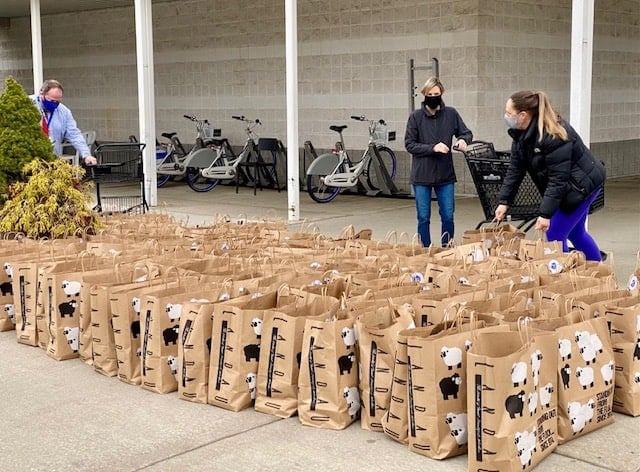
When the coronavirus pandemic hit the Princeton region last year, a grassroots group of residents sprung into action to help feed neighbors who had lost jobs. Many of the residents didn’t qualify for unemployment benefits or had trouble getting them because the New Jersey Department of Labor struggled to handle all the claims last spring. The food pantry was a lifeline for those residents, and now more than a year after the pandemic began, it continues to be as both needs and awareness about the program have grown.
The mobile food pantry is now an official non-profit, which enables the organization to apply for grants. Before the pandemic, the pantry operated out of the Pannell Learning Center and was managed by a small group of volunteers. Resident Liliana Morenilla began providing food-insecure Princeton families with food back in 2010, running her operation from the trunk of her car at the start. Now the group has about 50 regular volunteers who meet at McCaffrey’s to pack food bags and deliver them to families every other week. Food is purchased using donations, and no one in the organization is paid.
“I first heard about the food pantry from Liliana in 2018, and have been involved ever since,” said Amy Lansky, president of the organization. “We are a well-coordinated team of volunteers with a very clear mission – to provide food and other support to underserved members in the Princeton community. The pantry does this respectfully, and with compassion and cultural awareness.”
The primary focus of the group is families with children in Princeton Public Schools, but the organization also doesn’t turn away others in need who contact them, and volunteers work to connect people with resources and other services.
At the start of the pandemic last March, the pantry was feeding about 300 people, supplying them with meat, fresh produce, dairy products, shelf-stable food items, shampoo, toothpaste, and other essentials. The organization also coordinates deliveries of books, clothing, and other household goods in partnership with other grassroots groups and community organizations.
A year later, the program has raised more than $30,000 through donations and provides groceries every other week to feed about 500 people as the pandemic continues to affect local businesses and the job market.
The closures of restaurants, school cafeterias, offices, and other sources of employment have had a ripple effect on food service jobs, landscaping, domestic work, and other jobs. Some residents have lost jobs, and food pantry representatives said many people in the community have been forced to choose between providing food for their families or paying for essentials like rent, utilities, and healthcare. For some, this was already the case prior to the pandemic.
Even with the return to normal, food pantry leaders say there will still be lost wages, illness, death, and education deficits to overcome, so the need for support will continue.
“Supporting people in our community means the world to me, and I’m so excited for us to be able to assist even more of our neighbors,” Morenilla said. “Words can not adequately express my gratitude for the tremendous response we have received from the Princeton community in supporting our neighbors.”
For more information about the Princeton Mobile Food Pantry or to volunteer, visit pmfpantry.org.


https://ift.tt/3tXEa2J
food

Tidak ada komentar:
Posting Komentar